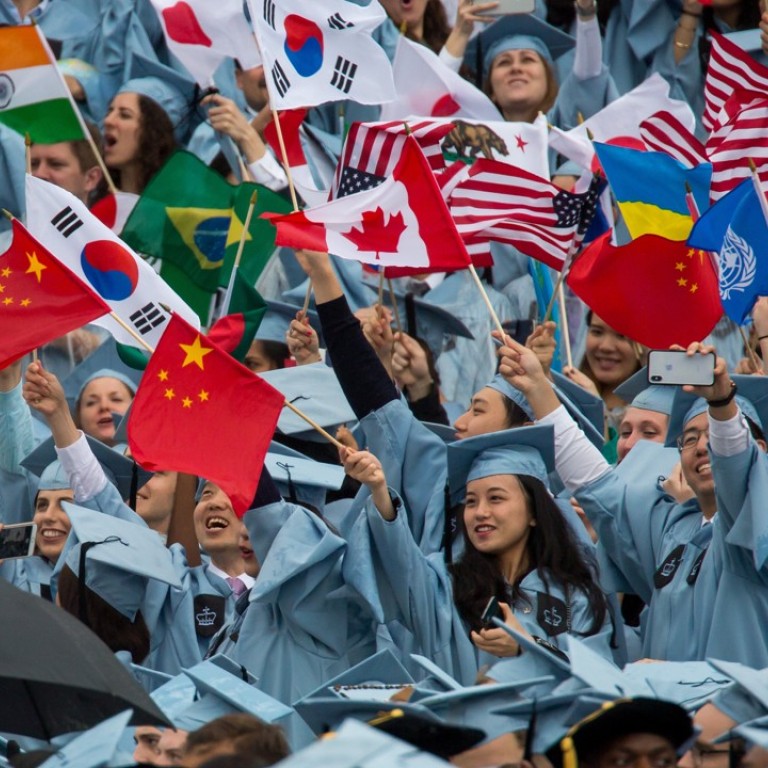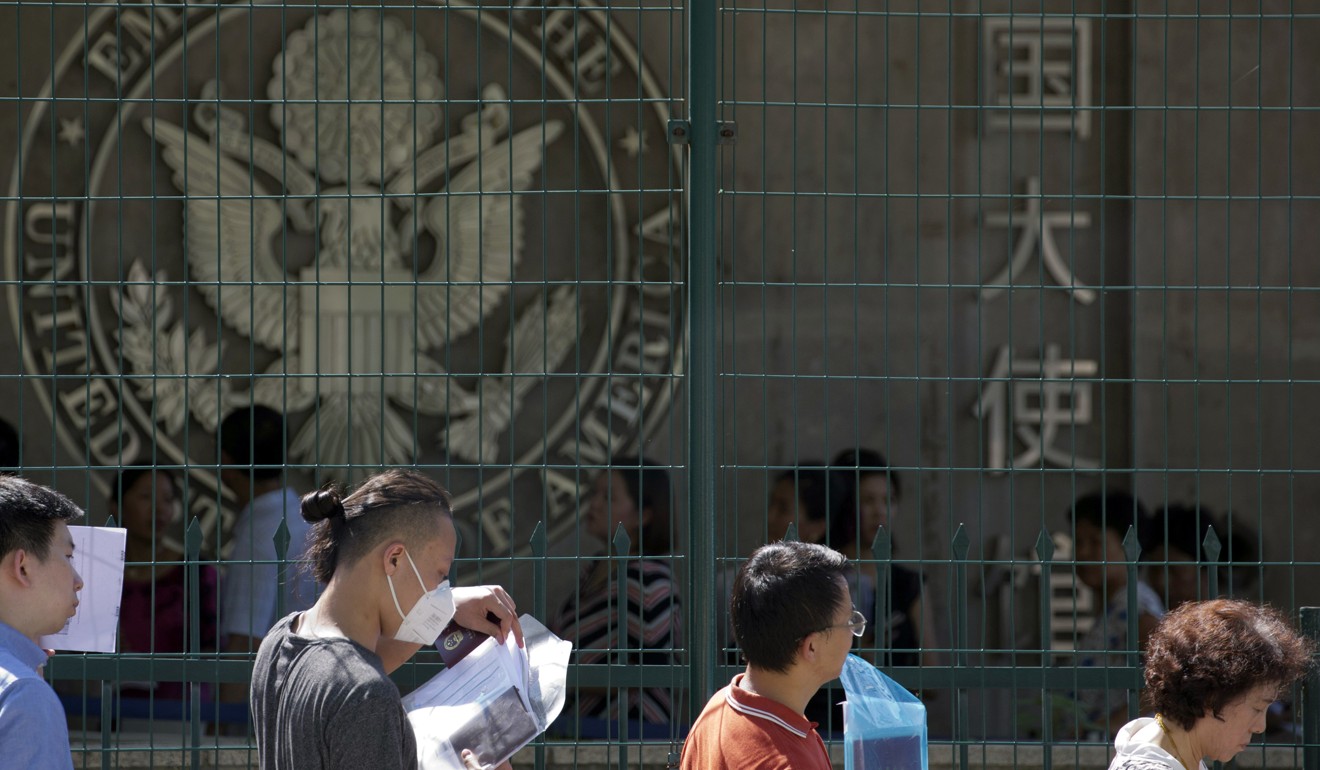
US-China hostilities draw mixed response on streets of Beijing
- Many students still regard the United States as an attractive destination, but others are looking to Britain as an alternative
- Distrust is growing, but negative attitudes are stronger among Americans
While hostilities between the world’s two largest economies have escalated as a result of the trade war, people in China seem divided on how their country should respond to the United States.
To Alex Zhou, a 22-year-old from Beijing, the trade war has barely changed his view of the US as an attractive destination.
Zhou, who graduated from a Beijing university a few months ago, still recalls with fondness his summer trip to the US in 2015.
“My parents love Yellowstone [national park] very much, but I prefer big cities like New York,” he said.

When Zhou and his family were in the US Donald Trump was a property tycoon who had recently emerged as a leading Republican contender in the 2016 presidential election.
Among the litany of grievances he vowed to tackle as president were China’s allegedly unfair trade practices. Nearly two years into his presidency, the resulting trade war has intensified fears that it will undermine global economic growth.
The confrontation has also spread to multiple fronts as Washington seeks to counter Beijing’s moves to expand its influence around the world with ambitious investment and infrastructure plans.
Zhou said he felt a little upset that Trump was targeting China but, “I can understand him because, as an American president, he is supposed to defend the interests of the US, not China.”
‘They cannot slow walk this’: US expects immediate action from China after trade truce, says Trump adviser Larry Kudlow
So far, the trade dispute has involved punitive tariffs by the US against a total of US$250 billion worth of Chinese products and Trump has threatened to impose tariffs on all remaining Chinese imports – about US$267 billion more in Chinese goods – if Beijing fails to address US demands over the course of the 90-day truce agreed in Argentina.
These demands include improved market access and intellectual property protections for American companies, cutting industrial subsidies as well as slashing a US$375 billion trade gap between the two countries.
But Zhou said that made little difference to his impressions of the US.
“I think the US remains very attractive, especially in the areas of advanced science and technologies, and many of my classmates and friends have worked really hard to go to the US for further education,” he said.
So far, the US remains a top destination for Chinese students – according to the 2018 Open Doors report on international educational exchange, more than 363,000 Chinese students – almost a third of international students – enrolled for the 2017-18 school year in US universities, an increase of 3.6 per cent compared with the previous school year.
Guo Bei, a vice-president at EIC Education, one of the leading overseas education groups in China, said despite trade tensions, the US remained an attractive destination for Chinese students looking for a better education.
“Most students want to have a wider vision when studying in the US,” she said.
“A diversified way of thinking, open values and a high standard of teaching are among the top reasons to choose the US,” Guo said, adding that majors in finance, management as well as engineering were particularly appealing to Chinese students.
Trade war: why US and China remain so far apart on intellectual property rights
In June, the US State Department introduced new screening measures for visa applications from Chinese students in sensitive research fields as part of Washington’s effort to curb intellectual property theft.
The move, which addresses a major complaint by Trump about Chinese trade practices, drew widespread concern that the Obama administration’s visa policy towards Chinese students may be reversed.
Such concerns, Guo said, had become apparent this year as her company had seen “a rapid growth” in the number of applications to universities in Britain.
“Many students who planned to go to the US have changed their minds and now want to go to the UK,” Guo said.
United States voids 10-year multiple-entry visas for some Chinese researchers
Censors in Beijing have also been watching the trade war with caution. Chinese media, which is strictly controlled by the government, has refrained from laying blame on the US president or his officials, despite its aggressive rhetoric against Trump’s trade policies.
Andrew Polk, co-founder of Beijing-based research firm Trivium China, said Beijing might be seeking to avoid any hint of instability amid rising domestic and international uncertainties.
“The Chinese government wants to play down the trade war because of the uncertainties as the government, to some extent, is rethinking its position and its strategy in the trade war,” he said.
“They don’t want to highlight the uncertainties, preferring to highlight stability and continuity.”
How Trump and Xi saved the world from economic pain and turned the trade war into a win-win situation
But not everyone is convinced.
Doris Zhang, who works in a pharmaceutical company in Beijing, said she had started to change part of her salary into US dollars due to fears the trade rift would exacerbate China’s economic slowdown.
“But I would prefer to buy American products rather than domestic-made products because the US usually has the strongest technologies in the world,” she said.
Li Wei, an international relations expert at Renmin University in Beijing, has warned against a long-term stand-off as the tariff war expands into a full-scale geopolitical competition between the US and China.
China takes steps to support jobs as trade war starts to hit employment
Last week, a group of China experts and scholars in the US warned that Beijing was attempting to influence American society on a wide scale, including through local governments, universities, think tanks, media, corporations and the Chinese-American community.
Their report – “Chinese Influence and American Interests”, published by the Hoover Institution and the Asia Society Centre of US China Relations – echoed the themes of US Vice-President Mike Pence’s speech in October, in which he accused Beijing of using its influence to interfere in the domestic policies and politics of the US.
Meanwhile, as previously reported in the South China Morning Post, the US embassy in Beijing revoked 10-year multiple-entry visas issued to some Chinese researchers into Sino-US relations, without explanation, amid tightened visa scrutiny.
US Vice-President Mike Pence accuses China of trying to undermine Donald Trump
“The distrust against each other is growing in the two societies and in China there have also been critical voices against the US,” Li said, adding that America’s public suspicions against China appeared to be more negative than Chinese attitudes towards the US.
“This is a terrible outcome as intensified distrust among the public, especially over the escalating clash on ideologies, would result in a long-term stand-off between the US and China,” he said.
“Governments, for their own interests, could quickly make peace after fighting, but it would be far more difficult to overturn public sentiment if such distrust intensified.”

